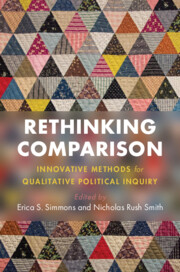Book contents
- Frontmatter
- Dedication
- Contents
- List of Figures
- List of Tables
- List of Contributors
- Acknowledgments
- 1 Rethinking Comparison: An Introduction
- Part I Rethinking the Building Blocks of Comparison
- Part II Developing New Approaches to Comparison through Research
- 7 Comparing Complex Cases Using Archival Research
- 8 Composing Comparisons: Studying Configurations of Relations in Social Network Research
- 9 Against Methodological Nationalism: Seeing Comparisons as Encompassing through the Arab Uprisings
- 10 Comparative Analysis for Theory Development
- 11 Problems and Possibilities of Comparison across Regime Types: Examples Involving China
- 12 Comparisons with an Ethnographic Sensibility: Studies of Protest and Vigilantism
- Theory and Imagination in Comparative Politics: An Interview with Lisa Wedeen
- Index
7 - Comparing Complex Cases Using Archival Research
from Part II - Developing New Approaches to Comparison through Research
Published online by Cambridge University Press: 24 September 2021
- Frontmatter
- Dedication
- Contents
- List of Figures
- List of Tables
- List of Contributors
- Acknowledgments
- 1 Rethinking Comparison: An Introduction
- Part I Rethinking the Building Blocks of Comparison
- Part II Developing New Approaches to Comparison through Research
- 7 Comparing Complex Cases Using Archival Research
- 8 Composing Comparisons: Studying Configurations of Relations in Social Network Research
- 9 Against Methodological Nationalism: Seeing Comparisons as Encompassing through the Arab Uprisings
- 10 Comparative Analysis for Theory Development
- 11 Problems and Possibilities of Comparison across Regime Types: Examples Involving China
- 12 Comparisons with an Ethnographic Sensibility: Studies of Protest and Vigilantism
- Theory and Imagination in Comparative Politics: An Interview with Lisa Wedeen
- Index
Summary
Many of the historical and contemporary phenomena in which social scientists are interested are difficult to study using traditional methods of comparative analysis. Since most cases are complex systems – marked by interdependence and operating at multiple levels of analysis at once – controlling comparisons to adjudicate causality is fraught with difficulty. This chapter argues that scholars can use historical archival research to help disaggregate the temporal and spatial properties of the phenomena we hope to compare while also tracing connections among those disaggregated elements. Specifically, practices associated with archival inquiry – classifying, contextualizing, layering, and linking – allow us to identify the boundaries around subsystems that can be treated as relatively independent while identifying the hierarchical connections tying those substemic activities together. The chapter concludes by showing how William Tuttle’s masterful history of the Chicago Race Riot of 1919 provides a template for comparing complex cases.
Keywords
- Type
- Chapter
- Information
- Rethinking ComparisonInnovative Methods for Qualitative Political Inquiry, pp. 129 - 151Publisher: Cambridge University PressPrint publication year: 2021

